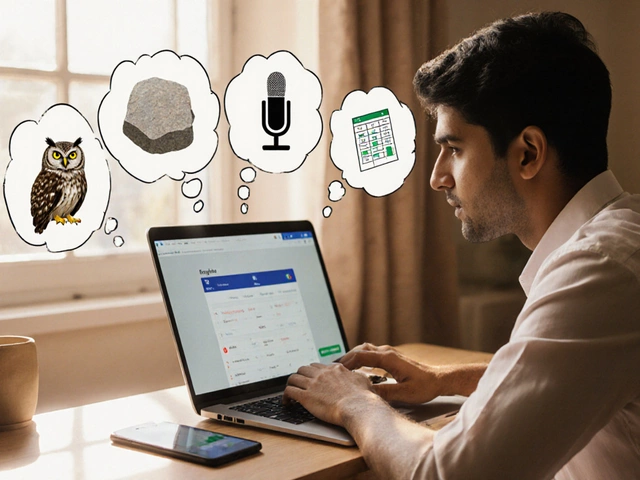
Ever been that person sitting in a room, perfectly understanding every ounce of English spoken to you—then freeze when someone tosses a question your way? You know the words, they’re screaming inside your mind, but as soon as it’s your turn, your tongue twists up worse than spaghetti. You’re just staring, missing that chance to shine. Here’s the thing: the gap between understanding English and speak English fluently (without those embarrassing mistakes) isn’t as wide as you think—it’s a leap anyone can make, even if you think you’ve got a ‘bad accent’ or you fumble grammar. The secret’s not some mystery app or a magic pill. It’s about changing how you approach the language, and honestly, letting go of perfection pressure. Stick around, because this is the guide nobody gave you in school—a real-world map for talking English with total confidence, even when you think people are judging every syllable.
Why Fluency Feels So Impossible—and Why That’s a Myth
Everyone wants to be flawless, but let’s get something straight: even native speakers mess up. People born into English swap "their" and "there" all the time, or say things like, “He don’t care.” Yet, those slip-ups never stop them from being understood. Truth is, the more you chase perfection, the more anxious and tongue-tied you become. English, at its core, is a mess of borrowed words—did you know over 60% of its vocabulary comes from other languages? It’s not a fixed, perfect machine; it’s wild, flexible, and forgiving. So why beat yourself up when you flub a tense or get a preposition tangled? Missing a few words won’t make your whole message crumble. Focus instead on communicating, not on sounding like an Oxford professor.
Fluency means more than perfect grammar. The British Council defines fluency as "the ability to speak smoothly, without too much hesitation or searching for words.” It doesn’t mean ‘without any mistakes.’ You can miss a verb and still keep the conversation flowing if you know what to do next. That’s why some immigrants, after just a few years, seem to chat away in English better than people who’ve studied from a textbook for a decade—they practice bravery over perfection.
The voice inside telling you to memorize every rule? Ignore it. Fluency lives in action, not in notebooks. If toddlers can make grown-ups understand them with just a fistful of words, adults can do it, too—only faster, because you already have a brain built for thinking. And here’s a kicker: people who are ‘almost fluent’ make small errors, but they don’t freeze up. They keep talking—even when part of their brain is still translating in the background. That willingness to push through is the real game-changer.
The Secret Sauce: Turning Fear Into Progress
If you spend your energy worrying about errors, you’ll forget the conversation you’re supposed to have. Here’s something language coaches know: people who laugh at their mistakes learn twice as fast. The science backs it up—a study by the University of Edinburgh found that students who relaxed and took risks improved not just their fluency but their overall memory of new words. Why? Their brains weren’t clogged by stress hormones.
So how do you get out of that ‘scared to speak’ rut? Try the “yes, and” rule. It’s a little trick from improv theater: whatever happens, you add to it. Flubbed a sentence? Smile, correct yourself, and keep going—your listener will usually help fill in the blanks. Most people are rooting for you, not looking to criticize. And the golden rule: speak first, fix later. Perfection comes with practice—not before it.
Practical tip? Record yourself speaking about something easy—your day, your breakfast, your opinion of Taylor Swift’s latest song (it doesn’t matter). Play it back, spot things you can tighten, then say it again. When you see yourself improving—even in the little things—you’ll be much braver in live conversations. Phones make this easy: there’s always a recorder in your pocket, just begging to be used for something smarter than voice notes about groceries.
Here’s a trick used by top language learners: shadow talking. Find a YouTube video or a podcast with subtitles, turn the speed to 0.75x, and try to say the words at the same time as the speaker. You’ll start to notice patterns, pauses, and those little linking words that make natives sound so smooth. Repeat this 10 minutes a day and you’ll notice yourself thinking in English faster than you imagined.

Building Real Fluency: Habits That Actually Work
Let’s dump boring grammar drills for a second. Instead, try what’s called “active practice.” Think of English as a muscle, one that needs regular workouts in small bursts—studies say multiple short sessions beat one giant cram every time. Aim for 15 minutes, three times a day. You can fit that in your commute, lunch break, or even in the shower (seriously, the acoustics help!).
Ever heard about ‘language islands’? That’s when you rehearse little chunks or stories you can whip out in conversation. For example, have a go-to story about your family, your work, or a movie you love. These islands help bridge gaps when you’re searching for words. You’ll sound more confident and you’ll be less likely to trip up when nerves hit.
Next, buddy up! Boring old advice, but here’s the twist: don’t look for another learner—find a regular person who just wants to chat (hello, online gaming communities, cooking clubs, or meetup groups). They don’t need to correct every mistake. You want people who make you forget you’re practicing. If that feels too scary, start solo: talk aloud to your dog, record diary entries, or narrate your actions (“Now I am cutting the onions… Oh, my eyes!”). The key is constant movement; don’t let the engine stop.
- Set up 'English hours' at home where only English is spoken
- Label objects around your house to absorb vocabulary naturally
- Switch your phone and social media apps to English
- Write short texts or comments online in English every day
- Swap stories with an English-speaking pen pal weekly
What about pronouncing those tricky sounds? Use tongue twisters like “She sells sea shells by the seashore.” Trip over them—that’s fine. Every stumble fixes the muscle memory a little more. If you really want feedback, apps like Elsa Speak or even YouTube can give suggestions based on real voice recognition. They're better than trying to mimic a fancy dictionary voice.
Let’s check out some real data pulled from Duolingo’s 2024 study (shown in the table below):
| Practice Method | Fluency Improvement (After 3 Months) |
|---|---|
| Speaking with native partners | +62% |
| Solo active practice (recording self, narrating) | +50% |
| Only textbook study | +18% |
See the jump? The numbers lay it out: get your mouth moving, your ears tuned, and skip the idea that pages alone will get you comfortable in a real chat.
Crushing the Most Common Mistakes — The Smart Way
You might feel haunted by certain phrases or words you always mess up. That’s normal—every learner has a ‘danger zone.’ Mess up “would” and “could”? Struggle with article usage (“a cat”, “an apple”)? The trick is to choose your top three mistakes, make a cheat sheet (on a sticky note or a phone note), and practice those daily for a week. That beats trying to fix everything at once.
Here’s another overlooked winner: context is king. Instead of memorizing single words, memorize phrases and full sentences. English leans on “collocations”—words that naturally go together, like “make a mistake” (not “do a mistake”). The more chunks you grab, the less likely you’ll sound off, even when you’re nervous.
If you’re stuck on tenses, try this: keep the present simple tense as your default. Most conversations use it, and even if you use the wrong tense, people usually get your meaning. Then, once you’re comfortable, sprinkle in the past or future tenses. No need to sound like Shakespeare from day one.
Articles (“a/an/the”) are a special pain, especially if your own language doesn’t use them. Watch a five-minute explainer video, write down five sentences with each article, and check them by running them through free websites like Grammarly. You’ll start to spot patterns quickly—often, way faster than a teacher could explain. Speaking of grammar aids: don’t rely on them, but don’t ignore them. Use them for feedback, then move on. Don’t let them zap your confidence.
What about slang and idioms? Pick the ones that come up a lot—like “piece of cake” or “break the ice.” Use just a couple until they feel natural. Don’t force them, just let them slide in when the moment’s right.
If writing trips you up, type your thoughts on a forum, then check how others reply. Reddit’s “EnglishLearning” or Facebook’s “English Speaking Club” are goldmines for real-world back-and-forth. Notice how people write the way they talk—you’ll absorb authentic structures fast.

Stepping Into Real Life: Keeping Your English Strong Forever
Fluency isn’t a final destination. If you stop using it, those words start to slip away—bit by bit. You’ve seen it with that friend who quit their language class and can barely order at a restaurant now. So, what keeps those top talkers sharp, month after month?
Routine is everything. Take something you already love—music, movies, sports, or cooking—and switch it to English. Watch shows you already know well so you’re following along for fun, not for comprehension stress. Sing along with your favorite band and mess up the lyrics. That’s how your brain sticks new sounds to old memories.
- Podcast on a morning walk—pause and repeat phrases out loud
- Short news stories each night—try to retell to a friend or family
- Follow a gaming streamer and join their chat in English
- Film yourself explaining your hobby and upload for feedback
Stay curious, too. If a native speaker uses a word you don’t know, ask what it means, then use it three times that day. It’s a little brain hack: after the third use, it’s much more likely to stick for good. And don’t forget old classics—word games, crossword puzzles, or silly quizzes. They challenge your vocabulary in a way flashcards can’t compete with.
Community helps. If you can’t find one in the real world, digital spaces are limitless. Monthly virtual book clubs, watch parties, or even meme-sharing groups—engage in things that make you laugh and relax. That’s when you’ll push through the fear and allow yourself to sound the way English learners really do: human, not robotic.
Remember, you’ll always make mistakes—everybody does. But if you keep walking, keep talking, and keep laughing at the stumbles, you’re doing what every confident English speaker does. The only difference is that now, you’ll actually enjoy the ride.




